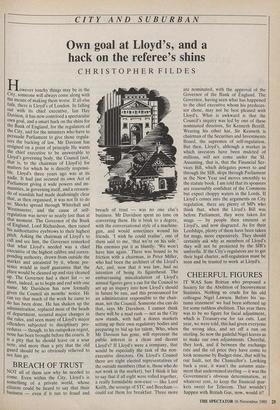BREACH OF TRUST
NOT all of them saw why he needed to come. Even within the City, Lloyd's is something of a private world, whose citizens could be heard to say that their business — even if it ran to fraud and breach of trust — was no one else's business. Mr Davidson spent no time on converting them. He is brisk to a degree, with the conversational style of a machine- gun, and would sometimes wound his friends. 'I wish he could realise', one of them said to me, 'that we're on his side.' His enemies put it as bluntly: 'We won't have him again.' There was bound to be friction with a chairman, in Peter Miller, who had been the architect of the Lloyd's Act, and, now that it was law, had no intention of being its figurehead. The embarrassing miscalculation of Lloyd's annual figures gave a cue for the Council to set up an inquiry into how Lloyd's should in future be run, and this pronounced for an administrator responsible to the chair- man, not the Council. Someone else can do that, says Mr Davidson. I cannot think there will be a mad rush — not as the City now stands, with half a dozen markets setting up their own regulatory bodies and preparing to bid up for talent. Who, when Mr Davison has gone, will represent the public interest in a clean and decent Lloyd's? If Lloyd's were a company, that would be especially the task of the non- executive directors. On Lloyd's Council there are eight elected representatives of the outside members (that is, those who do not work in the market), but I think it fair to say that if all eight were rolled together, a really formidable non-exec — like Lord Keith, the scourge of STC and Beecham could eat them for breakfast. Three more are nominated, with the approval of the Governor of the Bank of England. The Governor, having. seen what has happened to the chief executive whom his predeces- sor chose, may not be best pleased with Lloyd's. What is awkward is that the Council's inquiry was led by one of these nominated directors, Sir Kenneth Berrill. Wearing his other hat, Sir Kenneth is chairman of the Securities and Investments Board, the supremos of self-regulation. But then, Lloyd's, although a market in which investors have been mulcted of millions, will not come under the SI. Assuming, that is, that the Financial Ser- vices Bill, which delegates power to and through the SIB, skips through Parliament in the New Year and moves smoothly to the statute book. I am told that its sponsors are reasonably confident of the Commons but expect choppy waters in the Lords. If Lloyd's comes into the arguments on City regulation, there are plenty of MPs who think that, when the Lloyd's Bill was before Parliament, they were taken for mugs — by people then eminent at Lloyd's, and now disgraced. As for their Lordships, plenty of them have been taken for mugs, more expensively. They should certainly ask why as members of Lloyd's they will not be protected by the SIB's umbrella. If the City's regulators are to get their legal charter, self-regulation must be seen and be trusted to work at Lloyd's.


































































 Previous page
Previous page